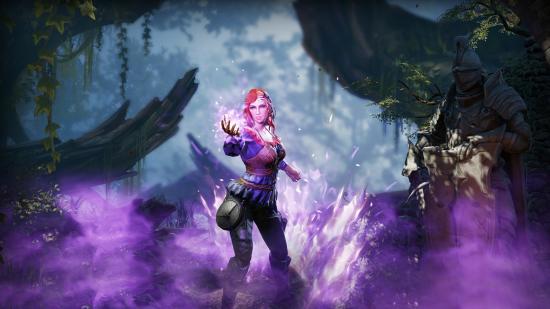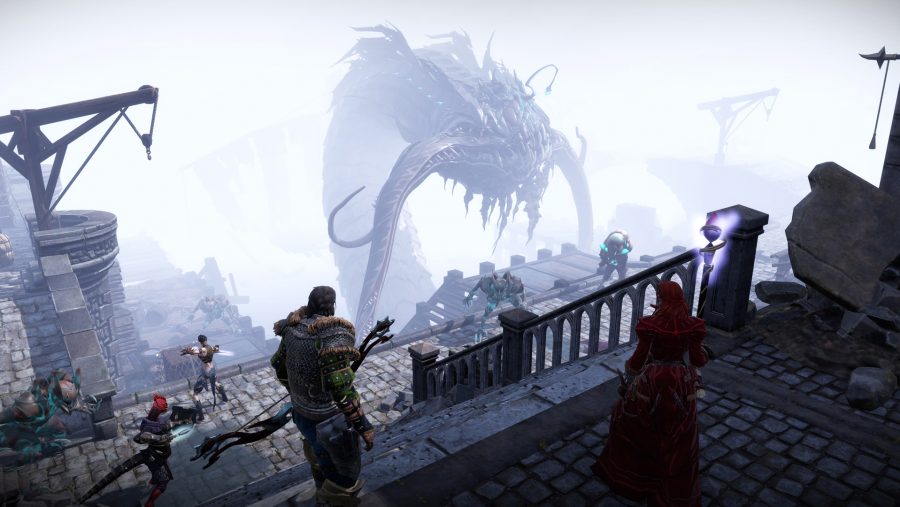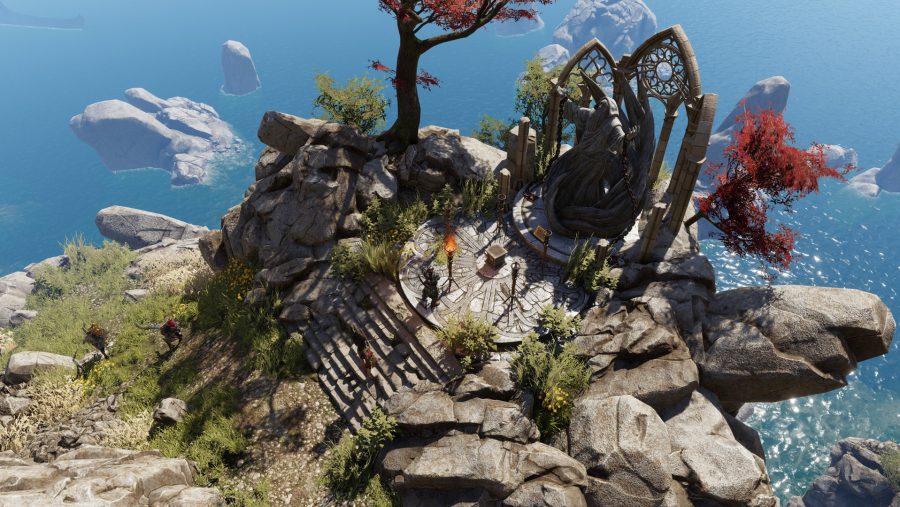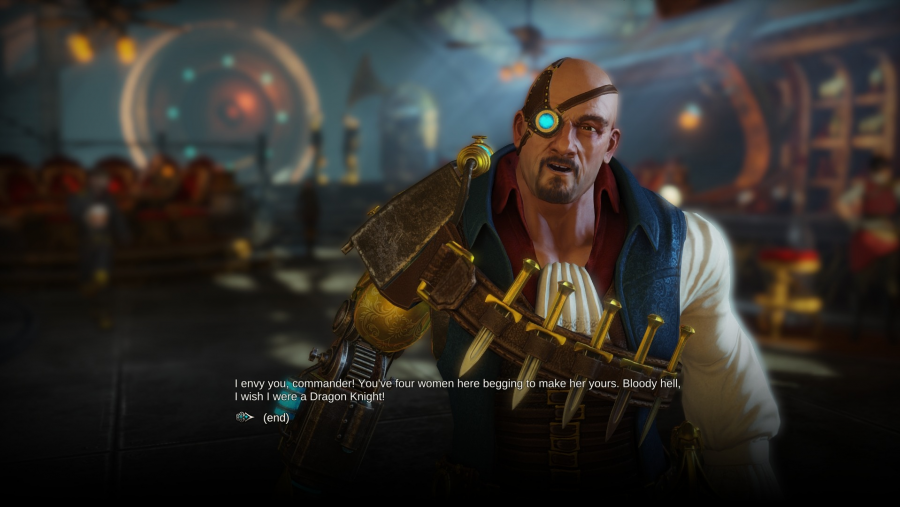Making a game is such a lengthy endeavour that, sometimes, at industry events when the hour is late, you can hear veteran devs turn to the subject of legacy and mortality. That’s probably doubly true for Larian, who has spent the last few years staring down at Fane, the long-dead Divinity: Original Sin II character who wears his age on his bleached bone face.
“We only have so much time in our lives,” studio boss Swen Vincke told PC Gamer last week. “When you think about your lifecycle, you start counting how many games you can make. It’s not that many. That’s why we need to move on and make new stuff.”
The question, then, is whether there’s life after death. Sorry: we mean whether we can work out what Larian’s next project is. We’ll save all speculation about the embrace of the abyss for another list feature.
For now, we’re delving into the history of Larian to find out what it can tell us about the studio’s future. Which is exactly the kind of eccentric questline the studio would come up with.
Divinity: Original Sin 3
There’s an obvious option here we’re not going to tiptoe around. Divinity: Original Sin sold 160,000 copies within its first week, becoming Larian’s fastest-selling game and making the studio critical darlings overnight. The sequel had sold over a million copies in two and a half months, and generated $85 million in revenue in 2017 according to SuperData Research.
The monetary argument for making another is clear, then – and it’s got strong creative backing, since the most recent Divinity games thrive on an extraordinary level of interactivity that only gets deeper with each entry. Digging into Vincke’s blog over the past few years reveals some of the studio’s thinking on the series.
“When we shipped D:OS my initial feeling was – that’s it,” he wrote in 2015. “I never want to see it again after having risked pretty much everything for it and having woken up with the monster it is for years. But then the feedback came in, together with criticism I thought was correct, and I started wondering what it’d take to fix it. And I wasn’t alone. Most in our team had the same feeling and wanted to improve things further.”
That iterative urge led to the creation of the game’s Enhanced Edition – and reemerged in the wake of Divinity: Original Sin 2, which received its own Definitive Edition just weeks ago. There’s no reason to assume that flame has died just yet. It’s worth noting, too, that Larian has worked exclusively in the Divinity universe since 2002 and become rather attached to its fanciful, freewheeling world – flexible enough to encompass alliterative comedy and existential horror with equal ease.
“Because we want the foundations to be rock solid, we’re spending a lot of effort on improving the first game in what hopefully becomes a series of games that will lead us to the RPG I’ve been dreaming of,” Vincke wrote three years ago. “You know, the very big RPG that will dwarf them all.”
Another RPG in another land
Since 2015 we’ve known that Larian has had two big RPGs in production. Divinity: Original Sin 2 accounts for one of those, but the other is a mystery. Outside of Ubisoft’s Assassin’s Creed factory, it’s hard to imagine a studio working on two sequels for a series simultaneously. Assuming this second game is still in production, it seems likely it’ll be Larian’s next offering. But what is it?
“There’s one I thing I can already tell you,” Vincke wrote on his blog. “Both RPGs are being built on top of the D:OS engine.”
If you’ve ever wondered why Larian put so much effort into reworking their released games – beyond the goodwill and extra sales the enhanced editions garner – it’s because the engine is an investment for the future. Any fix made in the two Original Sin games becomes a part of their next RPG and allows the studio to spend their resources on new ideas rather than reinvent UIs, pathfinding, or lighting systems.
“Our goal is to make new campaigns based on the same core single and multiplayer RPG engine which continuously gets improved, to perfect the rulesets driving it and to increase the amount of stuff you can do in our RPG worlds,” Vincke said. “All the while making the lore and universe(s) more solid. That latter (s) btw is something that may or may not materialise, so don’t wonder about it too much right now.”
Whether or not the second RPG is another Divinity spin-off or set in another world entirely, we don’t know. But it will at least feature dense, highly interactive environments, and focus on player freedom – the same potent freedom that allowed you to screw yourself over with poor party choices in Original Sin II.
“There’s tons of stuff we can do in the type of gameworlds we pioneered with D:OS and we intend to show that it was a mistake to abandon this type of gameplay in the beginning of the century,” Vincke said, “taking full advantage of the effort we already poured into D:OS.”
The wild card option
Larian has not often followed a predictable path. While Divine Divinity and its sequel reflected an industry shift at the time from isometric to 3D RPGs, the studio took a sidestep soon afterwards by developing the idiosyncratic strategy game Divinity: Dragon Commander, which gave us real-time command over battles and the capacity to marry skeletons. While Divinity: Original Sin might feel like safety now, it was an extraordinary risk – the most backwards-looking RPG in Larian’s history.
Dragon Commander steered the direct dragon control of Divinity II in a new direction – so the question is, what systems buried in Original Sin could support a surprising new spin-off? For my money, the best option would be a dedicated tactics game that leans on its fantastic combat engine. Hidden within Larian’s latest game is an exquisite arena mode, comparable to XCOM or some of Games Workshop’s smaller-scale tabletop games. It was hugely expanded in the recent Definitive Edition and is more than substantial enough to form the foundations of a new series.
“Our ambitions are really very high and I can’t wait to play some of the new things we’ll be trying,” Vincke said in 2015. “Throughout its history, Larian has always tried to do new things in each game we released, and we won’t stop doing that.”



